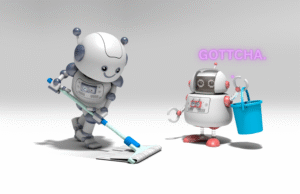Artificial Intelligence in Home Care: Enhancing Better Care at Home
The impact of artificial intelligence in home care services, encompassing both personal and professional spheres, is remarkable. Most importantly, it addresses the high standards for personalization and efficiency in healthcare offered remotely. Home healthcare services is one of the fastest-growing sectors globally and is expected to grow with a CAGR of 14.81% from 2024 to 2030. Furthermore, the number of adults over the age of 65 is projected to surpass those below 18 by 2034.
This increases the need for advanced automated technologies such as AI systems. Applications of AI in home care include wearable health monitors, smart home health aides, AI-enabled medication dispensers, and virtual health aides, which all aim to improve patient outcomes and healthcare services. Despite this, research shows that only three percent of home care providers have adopted AI technology, suggesting significant opportunities for innovation.

The Importance of Artificial Intelligence in Home Care Businesses
Adopting artificial intelligence in home care services offers great advantages. For one, AI helps caregivers work more efficiently by relieving them of repetitive tasks, such as data entry and scheduling. This allows staff to give more attention to patients. For instance, AI systems can handle complicated care plans and send real-time alerts for vital sign emergencies via wearables, enabling prompt action.
Secondly, AI enhances operational efficiency in scheduling, routing, and inventory control, minimizing costs and travel time. Thirdly, AI contributes to cost savings and improved outcomes. Real-time monitoring can avert hospital admissions, reducing costs and increasing satisfaction. An example is Bridge Home Health, which, after using the AI-enabled Careflo platform, experienced a 20% increase in referral conversion rates and a 5% increase in business growth.
Suggested Chart: Add a chart here demonstrating the impact of AI on caregiver efficiency or patient outcomes. Alt text: “Chart indicating positive outcomes AI has on patients in home care scenarios.”
Internal Link Suggestion: Link to a case study on your site focusing on solutions provided by AI in home care.
Relevant Services of AI for Home Care
AI’s application in home care provides a variety of services to satisfy diverse patient and caregiver needs. These services are grouped into systematic and tactical design, custom solutions, and ethical integration.
Strategy and AI Planning for Home Care
When a home care agency incorporates AI, it must first review existing workflows to determine where AI would be most valuable, such as easing administrative burdens or improving patient monitoring. Setting objectives—whether cost reduction or enhanced outcomes—is crucial. The agency must also ensure peripheral requirements, like adequate internet bandwidth and secure data facilities, are met. Strategic planning ensures alignment between AI integration and defined objectives.
Innovative Applications of AI Solutions in Home Care
AI home care solutions should be personalized to meet specific patient requirements. For example, patients with chronic illnesses like diabetes benefit from Continuous Glucose Monitoring (CGM) systems that track blood sugar levels and offer tailored advice. Elderly patients may interact with smart home assistants like Amazon Echo, which help with medication reminders and social engagement. Patients with mental health issues can use AI-powered applications that track moods and suggest coping strategies. Customized AI solutions enhance the effectiveness and personalization of care.
Social Responsibility of AI in Home Care
Ethical concerns must be addressed in AI implementation. Patient data privacy and security must comply with HIPAA laws, ensuring secure data handling. Transparent communication is required, so patients understand how AI is used and have the option to opt out. AI systems must minimize biases to deliver care without discrimination, with regular audits to sustain equitable care. AI should complement, not replace, human caregivers. Responsible use of technology fosters trust and maximizes AI advantages.
Internal Link Suggestion: Link to a blog post on ethical AI practices in healthcare within your site.
Choosing the Best AI Partner for Home Care
Selecting an AI partner can determine success for home care agencies. Consider this checklist:
| Expertise | Select a partner with proven healthcare AI expertise, backed by case studies. |
| Scalability | Verify solutions can scale to support larger patient volumes. |
| Support & Training | Expect comprehensive staff training and ongoing technical assistance. |
| Integration | Confirm interoperability with systems like electronic health records (EHRs). |
| Cost-Effectiveness | Determine costs in relation to enhanced operational efficiency. |
| Compliance | Ensure legal compliance with healthcare data security and privacy regulations. |
Agencies can streamline their AI implementation by prioritizing these factors to find the right partner.
External Link: For further information on selecting technology partners, check Deloitte Insights.
Developing Trends of AI in Home Care
Several trends will shape the future of artificial intelligence in home care. As AI merges with IoT devices and sensors, ambient intelligence enables unobtrusive patient monitoring, increasing comfort and compliance. Virtual care services, including telehealth and remote rehabilitation, are rising, with AI customizing interactions for better outcomes. Predictive analytics, which projects health challenges and enables proactive measures, is another key trend. Agencies must stay informed about these developments to remain competitive and provide unparalleled patient care.
Suggested Diagram: Include a diagram here depicting ambient intelligence in the home care setting. Alt text: “Diagram of ambient intelligence in AI-enabled home care systems.”
Internal Link Suggestion: Link to a page dedicated to emerging technologies reshaping healthcare on your site.
Conclusion
AI home care solutions have the potential to transform the industry by improving clinical and economic outcomes and operational efficiency. By strategically leveraging AI, addressing ethical considerations, and partnering with seasoned providers, home care agencies can meet the increasing demand for high-quality home-based care. As technologies like ambient intelligence and predictive analytics grow, responding to innovation will be crucial to harnessing AI’s true value. Start your journey toward an AI-supported home care model to enhance services and transform lives.
Internal Link Suggestion: Add a link to your website’s contact page for inquiries regarding AI solutions.
Call-to-Action: Inquire today to revolutionize care with AI and deploy responsive solutions for your home care agency.
/galaxy-s26-gets-smarter-samsung-taps-perplexity-ai-for-future-phones/
/nintendo-switch-2-release-date-price-and-features/
/playstation-state-of-play-june-2025-what-you-should-prepare-for/
/nintendo-switch-2-at-walmart-here-is-how-you-can-pre-order-it/
/apple-ios-26-expected-features-after-the-upcoming-announcement/



















Post Comment